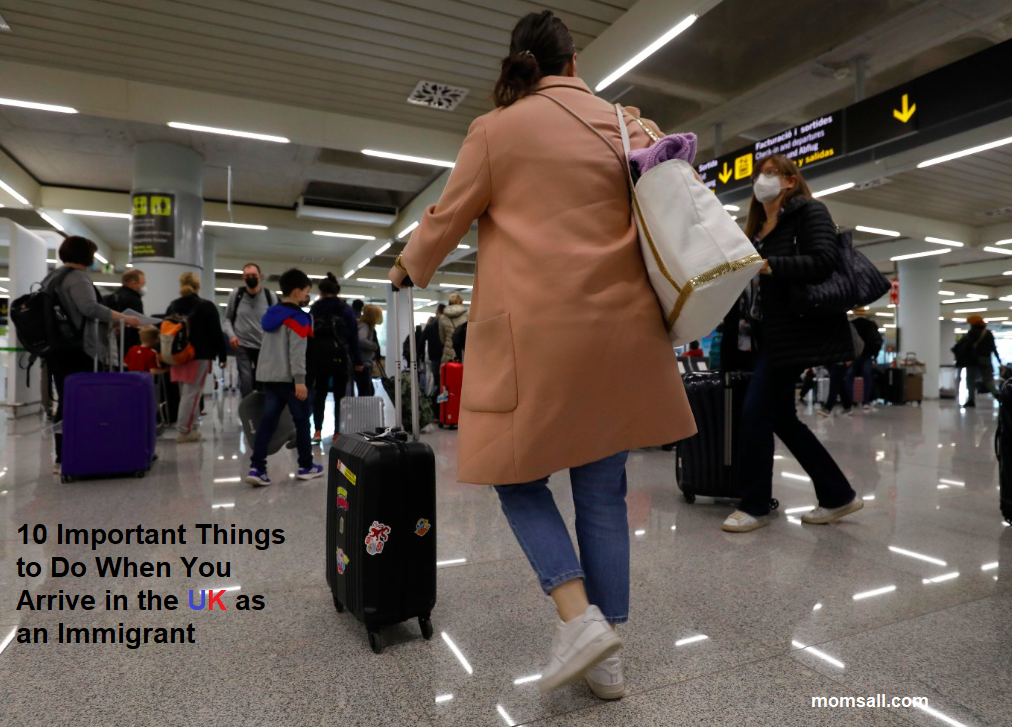10 Important Things to Do When You Arrive in the UK as an Immigrant – Arriving in the UK as an immigrant can be an exciting and overwhelming experience.
Whether you are an international student, a skilled worker, or a family member joining a loved one, there are several important tasks to accomplish to ensure a smooth transition and start your new life in the UK on the right foot.
In this comprehensive guide, we will provide you with a detailed checklist of 10 crucial things to do upon your arrival in the UK, as well as highlight new rules and regulations specifically applicable to international students.
Read Also: What they Don’t Tell You Before Moving to Northern Ireland
- UK Arrival Checklist
- Things to Do After Coming to the UK
- New Rules for International Students in the UK
- Advice for International Students in the UK
- International Student Checklist UK
- Rights of International Students in the UK
- How Safe is the UK for International Students?
- UK Arrival Registration
- Conclusion
UK Arrival Checklist
- Obtain your Biometric Residence Permit (BRP): As an immigrant, it is essential to collect your BRP within ten days of arrival. This card acts as evidence of your immigration status, allowing you to live, work, or study in the UK. You can collect your BRP at a designated post office mentioned on your visa decision letter.
- Register with the Police (if applicable): Some immigrants, depending on their nationality or visa type, may be required to register with the police. If this applies to you, ensure that you do so within the specified time frame, as failing to comply with this requirement may have legal consequences.
- Open a Bank Account: Setting up a UK bank account is crucial for managing your finances effectively. Research different banks to find one that suits your needs and book an appointment to open an account. Bring along your passport, BRP, proof of address, and proof of employment or enrollment.
- Obtain a National Insurance Number (NIN): If you plan to work in the UK, you will need a National Insurance Number to ensure proper taxation and social security contributions. Contact the Job Centre Plus to apply for your NIN, and they will guide you through the process.
Read Also: How to Switch From UK Student or Dependent Visa to Skilled Worker Visa
Things to Do After Coming to the UK
- Find Accommodation: Secure a place to live that suits your preferences and budget. You can consider renting a property, staying in university accommodation (for students), or exploring shared accommodations. Utilize online platforms and local estate agents to find suitable options.
- Set Up Utilities and Services: Arrange for essential services like gas, electricity, water, and internet connection for your new residence. Contact service providers in your area to get these utilities up and running.
- Familiarize Yourself with Local Transport: Learn about the public transportation system in your area, including buses, trains, and trams. Research routes, schedules, and fares to ensure you can navigate around the UK conveniently.
Read Also: The Fastest Way to Get a Nursing Job in the UK For Red List Countries
New Rules for International Students in the UK
- Understand the Points-Based System: The UK has implemented a points-based immigration system for international students. Familiarize yourself with the requirements and rules surrounding your visa, including academic progression, working restrictions, and extensions.
- Attend Visa and Immigration Briefings: Universities and educational institutions often conduct mandatory visa and immigration briefings for international students. Make sure to attend these sessions to stay informed about your rights, responsibilities, and any updates regarding immigration policies.
- Stay Compliant with Visa Regulations: Adhere to the terms and conditions of your visa, such as maintaining full-time enrollment, notifying authorities of any changes in your circumstances, and complying with employment restrictions. Stay updated on changes in immigration policies and consult with your institution’s international student support services if you have any concerns.
Read Also: Why it is advisable to Use Citizens Advice When You Have a Challenge in the UK
Advice for International Students in the UK
Navigating a new educational system and cultural environment can be challenging. Here are some valuable tips to help international students settle in and thrive:
a. Research and Prepare: Familiarize yourself with the UK education system, university policies, and the local culture. Understand the requirements of your course and gather information about your university’s support services for international students.
b. Attend Orientation: Participate in orientation programs organized by your university. These sessions are designed to introduce you to the campus, provide important information, and connect you with fellow students.
c. Build a Support Network: Join student societies, clubs, and associations to meet people who share similar interests. Engaging in social activities can help you establish a support network and make lifelong friendships.
d. Seek Academic Support: Don’t hesitate to approach your professors, academic advisors, or student support services if you have any questions or need assistance with your studies. They are there to help you succeed.
Read Also: The Fastest Way to Get a Nursing Job in the UK For Red List Countries
International Student Checklist UK
To ensure a smooth transition and settle in the UK, here’s a checklist of essential tasks to complete:
a. Accommodation: Arrange your accommodation before you arrive. Whether you choose university halls of residence or private housing, ensure you have a place to stay upon arrival.
b. Student Visa: Apply for a Tier 4 (General) student visa or the relevant immigration permission well in advance. Check the UK government’s official website for the latest visa requirements and documentation.
c. Bank Account: Open a UK bank account to manage your finances easily. Research different banking options and gather the necessary documents, such as your passport, proof of address, and student status.
d. Health Insurance: Understand the UK’s healthcare system and determine if you need health insurance coverage. Register with a local doctor (General Practitioner) and explore health insurance options if required.
e. National Insurance Number: Apply for a National Insurance Number, which is essential for employment and certain financial transactions in the UK. Contact the Department for Work and Pensions to begin the application process.
f. Mobile Phone and Internet: Set up a mobile phone plan and internet connection to stay connected with family and friends. Research different service providers and choose a plan that suits your needs.
Read Also: Why it is advisable to Use Citizens Advice When You Have a Challenge in the UK
Rights of International Students in the UK
As an international student in the UK, you are entitled to certain rights and protections. Here are some key rights you should be aware of:
a. Work Opportunities: Depending on your visa, you may be eligible to work part-time or during university vacations. Ensure you understand the work restrictions and regulations that apply to your specific visa category.
b. Protection from Exploitation: The UK has strict laws against exploitation and unfair treatment of workers. Familiarize yourself with your rights as an employee and report any instances of mistreatment or exploitation.
c. Equal Treatment: You have the right to be treated fairly and without discrimination based on your nationality, race, religion, or gender. Familiarize yourself with the UK’s equality laws and report any instances of discrimination.
d. Access to Education: As an international student, you have the right to access the same educational opportunities and support services as domestic students. If you face any issues or barriers, reach out to your university’s international student office.
Read Also: The Fastest Way to Get a Nursing Job in the UK
How Safe is the UK for International Students?
Safety is a top concern for anyone moving to a new country. The UK is generally regarded as a safe destination for international students.
However, it’s still important to take precautions to ensure your personal safety. Familiarize yourself with the emergency contact numbers, be aware of your surroundings, and follow any safety guidelines provided by your educational institution.
Additionally, it’s advisable to have travel insurance that covers medical emergencies, theft, and other unforeseen events.
Read Also: How to Buy a House in the UK as an Immigrant
UK Arrival Registration
Upon arriving in the UK, you must complete the necessary arrival registration process. This typically involves several steps, including:
a) Immigration Clearance: Ensure you have all the required immigration documents, such as your passport, visa, and any supporting documentation. Follow the instructions provided by the UK Border Force officers and provide accurate information during the immigration clearance process.
b) Biometric Residence Permit (BRP): If you’re from a non-European Economic Area (EEA) country and staying in the UK for more than six months, you will need to collect your BRP. This card serves as evidence of your immigration status and entitlements. You’ll receive a letter informing you where and when to collect it.
c) Register with the Police: Some individuals, depending on their nationality and visa type, may need to register with the local police within seven days of arrival. Check if this requirement applies to you and ensure compliance to avoid any legal issues.
d) National Insurance Number: If you plan to work in the UK, it’s important to apply for a National Insurance number. This unique number ensures you pay the correct taxes and national insurance contributions. You can apply for it after you’ve arrived in the UK, but the process may take a few weeks, so it’s advisable to start early.
Read Also: How to Ship Groceries From the UK to Family in Africa – Simple Guide
Conclusion
Arriving in the UK as an immigrant opens up a world of opportunities and experiences. By following these ten important steps, you can ensure a smooth transition and a successful start to your new life in the UK.
Remember to stay informed, seek assistance when needed, and embrace the diverse culture and opportunities that await you. Good luck!
Read Also: EB2 Green Card – How To Apply For The EB-2 Green Card





